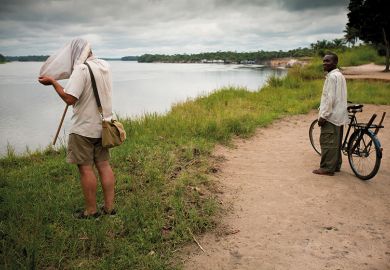In its 121-year history, the London School of Hygiene and Tropical Medicine’s efforts to fight disease in Africa, Asia and beyond have helped to save thousands of lives.
Most recently, its staff – including 1,600 researchers based at the Medical Research Council’s units in Gambia and Uganda – have been heavily involved in ending the Ebola outbreak in the Democratic Republic of Congo. Six years ago, the Bloomsbury-based school sent 500 UK-based staff to west Africa to tackle a far larger Ebola epidemic that claimed at least 12,000 lives.
Given those credentials for supporting Africa and Africans, some may have been surprised by the institutional contrition exhibited in an email by its director, Peter Piot, after the death of George Floyd during his arrest by Minneapolis police.
While its affirmation that “all Black Lives Matter” was unremarkable, as was its promise to “stand in solidarity with our black staff, students and alumni…and all those who pursue an end to racism”, Professor Piot’s message was more self-critical, acknowledging “uncomfortable truths about our own history, which has been shaped by colonialism and patterns of racial discrimination that characterise it”.
Some might question the value of this kind of soul-searching, given the immeasurable good done by the LSHTM. But others welcome the acceptance of the school’s contested history and, more controversially, its recognition of a bigger debate on whether global health as a discipline is still informed by colonial thought.
“The school is an interesting example – it was set up to serve colonialism and protect the British Empire, with the vast majority of those trained in its first 20 or 30 years going out to the colonies as health officers,” explained Lioba Hirsch, an archival researcher at the school’s Centre for History in Public Health, who is leading a project on its colonial history. “The majority of the school’s early fundraising was also led by [secretary of state for the colonies] Joseph Chamberlain and the Colonial Office,” added Dr Hirsch.
For her part, being aware of the school’s original mission does not detract from its achievements, Dr Hirsch insisted. “These two things can stand side by side, even if there is a bit of discomfort,” she said.
Moreover, recognising this legacy can be important when considering whether some of the inequalities of colonialism still reside within global health today, she said. “If you look at where the majority of global health funding goes, it is not to Africa, Asia or Latin America, where research is carried out,” Dr Hirsch observed, noting that the publications and the resulting prestige also tend to flow towards the Global North. Others have complained that African or Asian institutions are often asked only to complete ancillary roles, such as translation or data-gathering.
“While the discourse is different [from the colonial era], the dynamics [of global health] have not changed too much,” said Dr Hirsch.
While the conversation is certainly under way – the LSHTM has a Decolonising Global Health task force to consider these issues – the coronavirus pandemic has given it a new impetus by destabilising long-held notions about where expertise resides, said Mishal Khan, a fellow task force member and associate professor of health policy and systems research at the LSHTM.
“We’ve not learned lessons from low-income countries that have overcome public health emergencies, and [we have] assumed we would do a better job,” said Dr Khan. “But we’ve seen how detrimental it is to assume that solutions always originate in the West.”
This attitude, which some see as a form of neocolonial thinking, has meant that potentially effective measures have been ignored in favour of investment in flashy but unproven technological solutions, added Dr Khan. “There is a myth that solutions [from high-income countries] are better, which has led us to overlook countries that have successfully operated more informal community-based networks,” she explained.
Moreover, the entire reward system of global health, in which scholars publish journal papers that garner them citations, prestige and, ultimately, research funding, may reinforce these inequalities between the Global North and South, argued Dr Khan.
“This movement recognises that expertise is spread around the world, but some of these skills do not get the credit they deserve,” she explained. “Is it right to evaluate someone on their research metrics when someone operating in English as a second language doesn’t have the same opportunity to publish?” asked Dr Khan.
“That person might have really good local links and is able to implement change, so what is more valuable to public health?”
While it was “naive” to expect funders from Western countries to commit as much money to African principal investigators as they did to their own top researchers – an inequality decried by some – simply tackling the credit deficit faced by local researchers would be a good start, said Dr Khan.
“Funders will want to fund their own researchers, but we need to ensure that the contribution of those in low-income countries is properly recognised,” she said.
Some believe, however, that the coronavirus lockdown might help local researchers assume more senior roles, helping to correct this credit imbalance. Francesco Obino, head of programmes at the Global Development Network, which supports efforts to build institutional research capacity in Africa, Asia and Latin America, said many researchers believed “Covid-19 is an opportunity to reverse some of these trends, mainly because Northern researchers are not able to travel to developing countries”.
“Many staff of embassies and international organisations have been repatriated, leaving these organisations with no choice but to rely on local researchers,” added Mr Obino, who is based in New Delhi.
This new dynamic might be preferable to the “much less justified” funding of UK researchers to “travel to conduct research ‘locally’, where they inevitably collaborate with local researchers who know the place much better but often [take on a] support role”, he said.
Some worry, however, that the financial toll of the coronavirus pandemic might limit Western governments’ ability to support institutional capacity-building overseas, while universities might struggle to offer scholarships to outstanding students from Africa and Asia as international student fee income dries up.
“Global health, usually taught at postgraduate level, is a popular student subject at UK universities,” explained Justine Davies, professor of global health at the University of Birmingham, who said some courses cost as much as £24,000 a year.
“Many universities are increasingly looking at how to increase their profits from teaching. But without careful thought, increasing student numbers might increase the exploitation of those in poorer countries,” added Professor Davies on what could be seen as a controversial transfer of wealth from poorer countries to richer Western universities. “There are some scholarships, but the numbers are very small, and we need to see them increase,” she said.
Furthermore, if international student numbers grew at UK universities, this might “further the concept and actuality that global health is something that is done by white people to black or Asian people”, said Professor Davies, who added that “many people in the field of global health are increasingly uncomfortable with the neocolonialism of the subject”.
For Professor Davies, the emergence of the Black Lives Matter movement, as well as conversations about slavery, colonialism and controversial monuments, will help to foster more serious discussion of these inequalities, which she described as the “last vestiges of colonialism within UK academia”.
In mid-June, the Wellcome Trust’s executive leadership team published a statement saying that its library and collections “reflect a history of health and medicine that has its roots in imperial and colonial power structures in which black people, indigenous peoples, and people of colour have been marginalised and exploited”.
Admitting that “as a funder, an employer and a museum and library we have perpetuated racism”, the statement added: “We will accept responsibility for what we have done, and for not acting sooner.”
“Many people in global health came to this realisation a long time ago, but we’ve seen a shift [recently] as those in the higher echelons of global health have recognised that more needs to change,” reflected Dr Hirsch. “But we will have to wait and see what comes from it.”
POSTSCRIPT:
Print headline: Global health field dogged by a chronic colonialism
Register to continue
Why register?
- Registration is free and only takes a moment
- Once registered, you can read 3 articles a month
- Sign up for our newsletter
Subscribe
Or subscribe for unlimited access to:
- Unlimited access to news, views, insights & reviews
- Digital editions
- Digital access to THE’s university and college rankings analysis
Already registered or a current subscriber?








